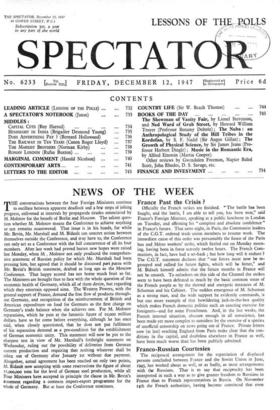Franco-Russian Courtesies
The reciprocal arrangement for the repatriation of displaced persons concluded between France and the Soviet Union in June, 1945, has worked about as well, or as badly, as most arrangements with the Russians. That is to say that reciprocity has been interpreted in such a way as to give greater freedom to Russians in France than to French representatives in Russia. On November 74th the French authorities, having become convinced that even these limits of freedom had been crossed by the Russian officials of a camp at Beauregard, raided it, found a small collection of arms and some evidence of other irregularities and immediately ordered the expulsion of 59 Soviet residents in France. To this story must be added two characteristic details. The French authorities are said to have used z000 Gardes Mobiles, which by any compthation was a remarkably large number to engage in such an operation ; and the Russians, with that quantitative rather than qualitative regard for human freedom which has become familiar in the case of the Russian wives of British husbands, protested that this was a lot of fuss to make about "three small children" (the immediate reason for the raid having been the rescue of three French children im- properly detained at the camp). Then this week came the main Russian counter-offensive. A note was handed to the French Chargé d'Affaires in Moscow accusing the French Government of breaking the repatriation agreement, recalling the Soviet repatriation mission in France (thus pointedly ignoring the fact that they had already been officially expelled), expelling the corresponding French mission from Russia, and breaking off trade negotiations between the two countries. This note has now been rejected by the French Government. This is a most formidable series of sledgehammer blows to crack what, on Russian showing, was the negligible nut represented by three small children. No doubt it has some connection with the new Communist policy towards France inaugurated by the setting up of the Cominform, and also with the sharp French reaction to the presence of M. Thorez in Moscow when the recent strikes began and the acceleration of the policy of violence when he came back. But however that may be it would be difficult to find a more striking example of how not to conduct international relations.





























